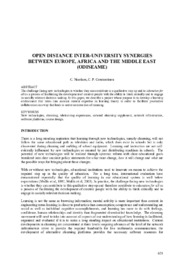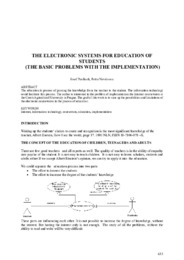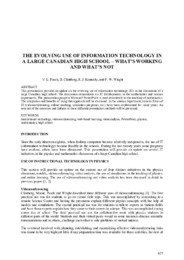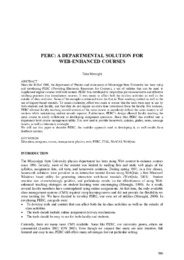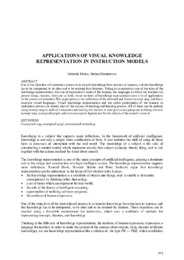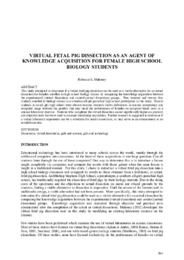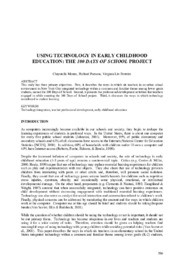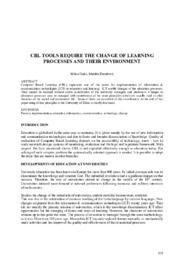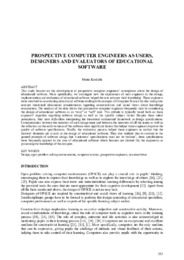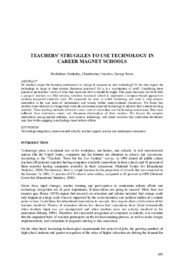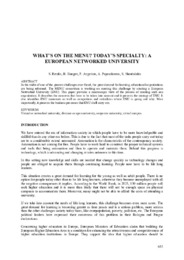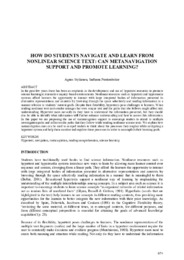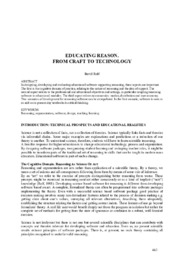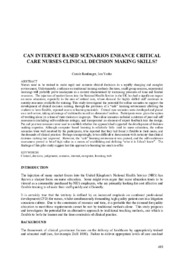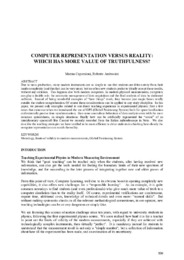Computer Based Learning in Science (CBLIS): Recent submissions
Now showing items 121-140 of 337
-
Open distance inter-university synergies Between Εurope, Αfrica and the middle east (odiseame)
(Department of Educational Sciences, University of Cyprus, 2003)The challenge facing new technologies is whether they can contribute to a qualitative step up and to education for all as a process of facilitating the development of creative people with the ability to think critically ... -
The electronic systems for education of students (the basic problems with the implementation)
(Department of Educational Sciences, University of Cyprus, 2003)The education is process of passing the knowledge from the teacher to the student. The information technology could facilitate this process. The author is interested in the problem of implementation the Internet coursewares ... -
The evolving use of information technology in a large canadian high school – what’s working and what’s not
(Department of Educational Sciences, University of Cyprus, 2003)This presentation provides an update on the evolving use of information technology (IT) in the classrooms of a large Canadian high school. The discussion concentrates on IT developments in the mathematics and science ... -
Perc: a departmental solution for web-enhanced courses
(Department of Educational Sciences, University of Cyprus, 2003)Since the Fall of 1998, the department of Physics and Astronomy at Mississippi State University has been using and developing PERC (Providing Electronic Resources for Courses), a set of utilities that can be used to ... -
Webtop: web-based interactive 3d optics and Waves simulations
(Department of Educational Sciences, University of Cyprus, 2003)WebTOP is a three-dimensional, interactive computer graphics system developed at Mississippi State University to help students learn about optics and waves. It has been used to help teach undergraduate introductory physics ... -
Applications of visual knowledge representation in instruction models
(Department of Educational Sciences, University of Cyprus, 2003)One of the objectives of instruction process is to transfer knowledge from teachers to learners, and this knowledge has to be interpreted, to be clear and to be retained from learners. Taking in consideration one of the ... -
Virtual fetal pig dissection as an agent of Knowledge acquisition for female high school Biology students
(Department of Educational Sciences, University of Cyprus, 2003)This study attempted to determine if a virtual fetal pig dissection can be used as a viable alternative for an actual dissection for females enrolled in high school biology classes by comparing the knowledge acquisition ... -
Using technology in early childhood education: the 100 days of school project
(Department of Educational Sciences, University of Cyprus, 2003)This study has three primary objectives. First, it describes the ways in which six teachers in an urban school environment in New York City integrated technology within a common and familiar theme among lower grade students, ... -
Moving from local to global teaching: integrating appropriate technologies – a reflection
(Department of Educational Sciences, University of Cyprus, 2003)There are many reasons why universities and other tertiary education institutes are moving away from providing local (or face-to-face) teaching to global teaching. Our School of Computer and Information Science is one that ... -
CBL tools require the change of learning processes and their environment
(Department of Educational Sciences, University of Cyprus, 2003)Computer Based Learning (CBL) represents one of the terms for implementation of information & communication technologies (ICT) in education and learning. ICT enable changes of the education processes. They cannot be realized ... -
Simulations, applets and learning in schools
(Department of Educational Sciences, University of Cyprus, 2003)This paper reviews the problem of establishing learning effects with computer simulation packages in science teaching. It is stated that evidence is accumulating about the effects of simulations in a laboratory environment ... -
Prospective computer engineers as users, designers and evaluators of educational software
(Department of Educational Sciences, University of Cyprus, 2003)This study focuses on the development of prospective computer engineers’ conceptions about the design of educational software. More specifically, we investigate how the experiences of such engineers in the design, ... -
Teachers’ struggles to use technology in career magnet schools
(Department of Educational Sciences, University of Cyprus, 2003)Do teachers expect the learning environment to change in response to new technology? Or do they expect the technology to adapt to their routine classroom practices? Or is it a combination of both? Underlying these questions ... -
What’s on the menu? Today’s specialty: a European networked university
(Department of Educational Sciences, University of Cyprus, 2003)In the midst of one of the greatest challenges ever faced, the great demand for learning, educational organizations are being reformed. The MENU consortium is working on meeting this challenge by creating a European Networked ... -
How do students navigate and learn from nonlinear science text: can metanavigation support and promote learning?
(Department of Educational Sciences, University of Cyprus, 2003)In the past few years there has been an emphasis in the development and use of hypertext resources to promote science learning in interactive inquiry-based environments. Nonlinear resources such as hypertext and hypermedia ... -
Educating reason. From craft to technology
(Department of Educational Sciences, University of Cyprus, 2003)In designing, developing and evaluating educational software supporting reasoning, three aspects are important. The first is the cognitive domain of practice, relating to the nature of reasoning and the idea of support. ... -
Can internet based scenarios enhance critical Care nurses clinical decision making skills?
(Department of Educational Sciences, University of Cyprus, 2003)Nurses need to be trained to make rapid and accurate clinical decisions in a rapidly changing and complex environment. Unfortunately, a reliance on traditional training methods (lectures, small group sessions, experiential ... -
Exploiting internet & multimedia technologies to advance educational process
(Department of Educational Sciences, University of Cyprus, 2003)Internet technologies and multimedia applications are becoming the new trend in educational process. The number of schools, universities and other educational institutions that intend to adopt computer-based learning is ... -
ICT in science teaching Investigating the spreadsheets integration Into science teaching to promote both curriculum aims and science skills via ict strands
(Department of Educational Sciences, University of Cyprus, 2003)Spreadsheets can be implemented into Science teaching as learning tools. The issue is that whether such ICT integration (Spreadsheets) into science teaching can facilitate both the: a) Promotion of specific curriculum aims ... -
Computer representation versus reality: which has more value of truthfulness?
(Department of Educational Sciences, University of Cyprus, 2003)Due to mass production, many modern instruments are so simple to use that students are driven away from their inside complexity (and this fact can be very nice); but too often now students prefer to blindly accept those ...
